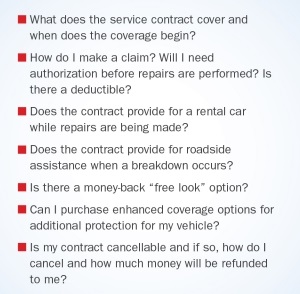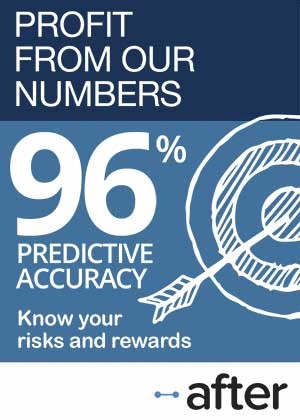October 3, 2013 |

|
ISSN 1550-9214 |
Extended Warranty Image Problems, Part 3:Does the industry need a spokesman to educate consumers about the value and convenience of service contracts? Or does it already have a spokesman that also acts as the industry's attorney? And if a new spokesman is needed, who will pay for what will be a costly and time-consuming ongoing expense?At the Fourth Annual Extended Warranty & Service Contract Innovations Conference held last month in Nashville, the industry's image problem was a major topic. In the past two newsletters we've laid out some of the issues and problems. In this newsletter, we'll outline what some see as a possible solution: the employment of a man or woman whose job it would be to serve as the industry's spokesman. For the past seven years, it's been fashionable for consumer advocates to say "Don't buy them" when asked about the value of service contracts. That's what they say: avoid buying service contracts. The likelihood of needing more repair coverage than the manufacturer's warranty provides is low, they say, and even if an out-of-warranty repair is needed, its cost will be lower than the typical service contract's price. Hogwash, we all answer back, but nobody believes us because we're all trying to sell more service contracts. But what if there were a trusted third party who could furnish the media with objective facts about the frequency and severity of repairs for multiple products, about the number of consumers who've saved money with service contracts, and about the good versus the bad actors in our industry? Consumer Reports StrikesIn some ways, we already have such a spokesman in the form of the Service Contract Industry Council, which was formed in 1988 with a very different job in mind: to act as a kind of industry attorney that could help to harmonize the laws of the 50 states so that service contracts could be offered in a consistent manner nationwide. But after Consumer Reports launched its "Dear Shopper" effort in November 2006, taking out a full-page ad that called extended warranties "a big waste of money," the SCIC has taken on a second role as a spokesman for its members, who write at least 80% of the service contracts sold in the U.S. each year. However, some are now saying that perhaps the SCIC should focus on what it does best, and a new entity should instead take on the PR job. And at the Extended Warranty & Service Contract Innovations Conference last month, when someone suggested that we need a spokesman for the industry, Terry Hawkins, the president of the Global Warranty and Service Contract Association, asked the gathering, "What about us?" 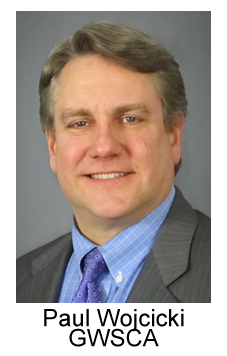
So for the past few weeks, that idea has been percolating around. And then this week, Paul Wojcicki, the secretary of the GWSCA and an attorney with the Chicago-based law firm Segal McCambridge Singer & Mahoney Ltd., said the battle for the hearts and minds of the consumer has to be fought on two fronts: in a court of law, and in the court of public opinion. Needed: Industry SpokespersonTo accomplish that, the industry needs both a good lawyer and a good spokesman. "In fact, our industry needs not just a spokesman," he said, "but the organization behind a spokesman to get the word out; to defend the industry against isolated complaints and unfair attacks, but also to remind the marketplace of the value that service contracts bring to purchases big and small." There are, however, already a variety of people who serve as spokespersons for different segments of the industry. Some represent a particular type of service contract, such as home warranties. Others represent the industry in general to legislators and regulators in specific. Wojcicki said he thinks the right spokesperson has to represent the entire industry to not only government and media, but also to consumers looking for advice. "The spokesperson has to coordinate with the various segments, so that a cohesive, clear and positive message can be delivered," he said. Such a job is likely to require a full time paid staff, so it's not going to be free. Still, the tab is likely to be a small fraction of the $37.9 billion in service contract premiums expected to be collected from U.S. consumers this year. "It can't be a part-time thing," Wojcicki said. "You need someone who is a professional in that role. They would have to be available 24/7 to respond. They have to be able to respond in real time when issues hit. They essentially have to be tethered to their smartphone so they can address issues as they arise and respond to media inquiries." Full-Time Paid Position?And he said he doesn't think it could be a volunteer, because that's one of the biggest challenges faced by the GWSCA: its volunteer staff already have other jobs, and they can't just drop everything to fly to Atlanta to be on CNN. "You need an organization with the infrastructure to stay on top of what's going on in the marketplace, what's going on in the industry and what's going on in the media," he said. That's probably not possible with a volunteer staff. The SCIC, Wojcicki said, has for a quarter-century been focused on the legal side of the industry. "They have done a great job on the regulatory and legislative front," he said. "They've led the way and they've accomplished a great deal." In addition to being one of the first to respond to the Consumer Reports "big waste of money" ad, they also responded to the US Fidelis scandal and other incidents that have put the industry in a bad light. "But they really haven't taken on the role to date to be the voice of the industry, to be the face of the industry," Wojcicki said. "I think we need an association that is prepared to take on the role on behalf of the entire industry, and to work with the different segments of the industry." So is this something the GWSCA could do? Wojcicki said he thinks the answer is yes. "Not only is it something we can do, but I think it's something that we are building towards and are trying to do." The first part of that effort began last year, with the name change from the Institute of Warranty Chain Management to the Global Warranty and Service Contract Association. Adding the words "Service Contract" into the name overtly stated that the group wasn't just about manufacturer's warranties. Training a SpokespersonAnd then in regards to the professional training that the GWSCA is now providing to its members, he added, "it's not just to make them better at their jobs, but to prepare and equip them to respond to issues, to be knowledgeable about the value proposition that service contracts represent, to be in a position to respond when need be, and to have that debate in a cogent way favorable for their own company but ultimately favorable for the industry as well." The next step is going to be to convince the GWSCA membership that paying for a spokesperson infrastructure will be an investment in their own businesses. For most manufacturers and retailers, service contracts now represent perhaps three to seven percent of their total revenue. Why can't the industry, with an improved image and a well-crafted message about value and convenience, get that up to 10% or even 15%? "The idea is not to displace anything that the SCIC or any other group is doing in this space," he said. "The idea is to provide that focal point -- to be that hub." The problem is, it's hard to get the service providers to pay for something they already do themselves. Marketing communications -- even tasks borne of new technologies such as social media monitoring -- is something that most companies already have in place. 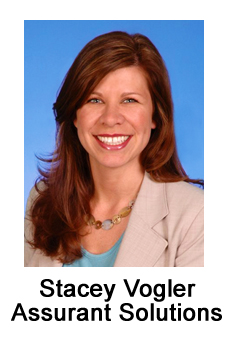
Stacey Vogler, the vice president of marketing and product development at Assurant Solutions, said she's not so sure that the industry needs to employ a spokesperson. "We would want to weigh the industry view versus doing similar activities on Assurant's behalf. We already do some things around the holidays. And we're going to be trying some different things this year as well. I think seeing how those work, having that data, and looking at the bigger picture of what this concept could do for us would be how we would make that type of decision," Vogler said. "I think it depends on what that purpose -- what that cause is," she added. "What will they be taking on? And is the value of that measurable? What would be the objective? What kind of results would we expect?" In addition, despite the negative image of the industry that typically gets some play around the holidays, consumers are still buying plenty of service contracts. Last year, for instance, Assurant reported worldwide service contract revenue of over $1.8 billion, up more than 7% from 2011. That's not a sign of an industry in crisis that needs help with its image. So does the service contract industry need a spokesman? "We've been thinking about that question," Vogler said. "And we talk with consumers quite a bit -- through focus groups, and engaging with them when they have plans or are going through the purchase process. Through that, we've learned a lot about who consumers trust and what they're looking for. And what we've learned is that customers trust other customers more than anyone else." Therefore, she concludes, the best spokesperson of all is going to be a happy customer speaking to a prospective customer. "Over the years, we've been focused on understanding who the customers are, what they want, why they buy, and why they don't, and then creating and evolving new plans, programs and products to make them more valuable for customers. And we're focusing on the post-purchase experience that a customer has when they experience an issue with the product, making sure they get the coverage they deserve and the service they deserve when they do own a plan," she said. Happy Customers"There are a lot of happy customers out there," Vogler added. "What we try to focus on from an endorsement or a spokesperson standpoint is creating happy customers and giving them a stellar customer experience, so that they not only endorse the service, but also endorse the industry and endorse us as a company to do business with." From a business perspective, Vogler said she can also see the value of having some kind of consumer advocate who can speak on behalf of the industry to journalists and researchers. But it would have to be someone who can be seen as independent of the retailers, manufacturers and insurance companies, she added. The ideal candidate would be someone who consumers already follow and trust, she said, preferably for financial advice of some kind. It also could be the executive director of a trade association. "The key question for me is does this person have a customer following? Is there a network of consumers that follows this person and trusts him or her?" Vogler asked. "In terms of going toe-to-toe with Consumer Reports, this person needs to have the consumer's best interests in mind in order to be effective." And again in that case, Vogler said it ultimately would be the consumer that benefits. They would be receiving accurate and unbiased advice from an expert about the value of protection plans, so they could decide whether or not to buy with a more thorough understanding of the facts. Vogler said that if consumers had the full story they would look much more favorably upon protection plans. So it really comes down to deciding the best way to reach them with that full story. Would it be through a spokesperson? Or through some other means? Trade Group or Consumer Advocate?However, wouldn't an executive director of a trade group be there primarily to serve his/her members and their businesses? So can he/she really ever be seen as a trusted financial advisor to consumers? "With online now being such a powerful tool for consumers, they have access to information that they didn't previously," Vogler said, "so it allows us to tell our side of the story. We can talk to consumers directly. They can rate and review our products, sharing their experiences with each other. We can provide the pros and cons, what to look for in a plan, and get a lot of that information directly to customers to help them make the best decisions for themselves." Vogler added that if there was an organization or an advocacy group out there that was also willing to provide that kind of information, Assurant Solutions would certainly try to help them. It already does so for the SCIC, and indeed, it is providing information for this very newsletter. "We make ourselves available to editors and people looking for answers to questions around this topic. And I think as an industry, the providers in it have gotten more involved in doing PR and media than in years past. And I think we'll continue to see that rise as well," she said. So perhaps there's an opportunity for the industry to provide a counterweight of some sort to the "don't buy them" stories? "There might be a way for the SCIC or someone else to maybe not necessarily have a spokesperson, but provide a resource where the media can turn to get the whole story, in terms of how many claims are paid, how often they're paid, how often consumers benefit, and why consumers should consider protection plans on various products," Vogler said. "Our research has shown that consumers buy these for a variety of reasons: it's peace of mind, cost certainty, knowing that you're going to have a repair done by a certified technician. There is real value that consumers see in these benefits, and that's why they continue to buy them in spite of the annual Consumer Reports article that says 'don't do it.'" Counsel for the DefenseMeanwhile, as others think about appointing an industry spokesman, the guy that's been serving as the industry's attorney and spokesman for a quarter-century also is left wondering, "What about us?" 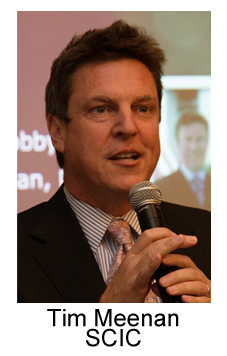
Tim Meenan, executive director of the SCIC and an attorney with the law firm of Blank & Meenan, said the SCIC has done its best on behalf of the industry to respond to the Consumer Reports attacks, to the US Fidelis scandal, and to the ongoing efforts to talk people out of buying service contracts. "We have done our best with the budget we have to defend the industry," Meenan said. "We've had a media firm on retainer for five or six years, and have issued reams of press releases. We've gotten stories into the Los Angeles Times. We've been on Yahoo Finance numerous times. We've been on Wall Street Market Update. We're out there advocating positive images. And that's helped." In fact, six days after Consumer Reports ran its full-page "Dear Shopper" ad on the back page of the "Money" section in USA Today, the SCIC ran its own rebuttal ad in the same section of the same newspaper with a similar layout. "We spent $40 grand running that, just to create some kind of counterpoint," Meenan said. However, ever since, while some of the national media outlets have rerun that story every year in the run-up to the holidays, they rarely go looking for that counterpoint nowadays, he added. "We've had letters and phone calls with executive producers at all of these, to say there's two sides to the story, and they're choosing to report just one." Still, there are a number of media outlets that have reported in some fashion the SCIC's position that sometimes service contracts can be valuable. Here's a list of links to some of the media successes the SCIC has achieved in the last few years: Figure 1 |
||||||||||||||||||||||||||||||||||||||||||||||||||||||||||||||||||||||||||||||||||||||||||||||||||||||||
| ||||||||||||||||||||||||||||||||||||||||||||||||||||||||||||||||||||||||||||||||||||||||||||||||||||||||


